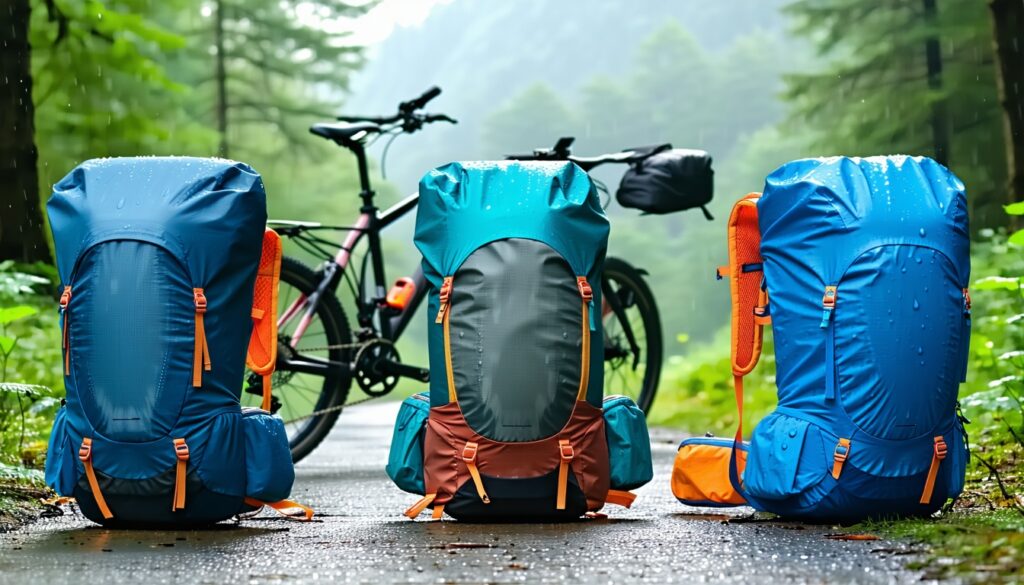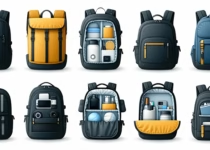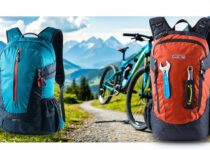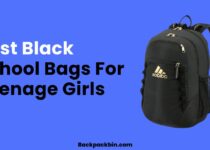Best Cycling Backpacks with Rain Covers Included

Top Cycling Backpacks
Choosing the right backpack can make a significant difference during cycling adventures. Here are two top cycling backpacks that stand out for their practicality and features.
Chrome Kadet Backpack Overview
The Chrome Kadet is designed for quick trips around town, making it a versatile addition to any cyclist’s gear. This backpack can accommodate essentials like a camera or an extra layer, providing enough space for all necessary bike items.
Key Features:
- Sling style: Comfortable for carrying on one shoulder.
- D-lock holster: Securely carries a lock, ensuring that it can be accessed quickly when needed.
- Lightweight design: Easy to carry without feeling cumbersome.
| Feature | Description |
|---|---|
| Capacity | Ideal for essentials |
| Weight | Lightweight |
| Style | Sling |
| Additional Info | Includes D-lock holster |
For those looking for a reliable backpack that combines convenience and functionality, the Chrome Kadet is an excellent option. More about ergonomic cycling backpacks can be found by following the link.
Ortlieb Commuter Daypack Features
The Ortlieb Commuter Daypack is recognized as one of the best dry bag options available. It’s particularly favored for its durability and organizational capabilities, making it suitable for daily commutes or longer rides.
Key Features:
- Large main compartment: Offers ample storage space for gear.
- Removable inserts: Enhances organization for smaller items.
- External loops: Ideal for attaching a lighting system, ensuring visibility while riding.
| Feature | Description |
|---|---|
| Capacity | Spacious with organizational inserts |
| Waterproof | Yes |
| External Loops | For mounting lights |
The Ortlieb Commuter Daypack keeps your belongings safe from wet conditions while also providing an organized way to carry gear. For additional insights into storage capabilities and features, check out our section on hydraulic-compatible cycling backpacks.
Both the Chrome Kadet and Ortlieb Commuter Daypack highlight the importance of functionality and durability in cycling backpacks, especially for those who prioritize staying dry and organized while on a ride.
Visibility and Safety
Safety is paramount for cyclists, especially during low light conditions. Selecting a backpack that prioritizes visibility and has reliable safety features can significantly enhance a rider’s experience. In this section, we will review two notable options: the Provis Reflect360 Backpack and the Altura Thunderstorm Backpack.
Provis Reflect360 Backpack Review
The Provis Reflect360 Backpack stands out for its excellent visibility. It is designed specifically for low light and night cycling, utilizing strong reflective material to ensure that the wearer is highly visible. The backpack features comfortable straps intended for ease of use and a long zipper for convenient access.
While the visibility rating is impressive, it’s important to note that the Provis Reflect360 lacks weather protection. While it is not waterproof, cyclists can combine it with a reflective waterproof cover for all-weather usage.
| Feature | Details |
|---|---|
| Visibility | High reflectivity for nighttime cycling |
| Comfort | Wide straps for comfort |
| Waterproofing | Not waterproof; cover recommended |
| Zipper | Long zipper for easy access |
Altura Thunderstorm Backpack Comparison
The Altura Thunderstorm Backpack is a budget-friendly alternative to other high-end options, such as the Ortlieb Commuter Daypack. It provides a similar capacity and visibility features at a more affordable price point. This backpack incorporates reflective dashes and light loops, ensuring cyclists are more visible during low-light conditions.
While the Altura Thunderstorm offers excellent visibility, it does fall short in terms of waterproof capabilities when compared to premium models. It is recommended for those looking for a good balance of cost and visibility without needing extensive weather protection.
| Feature | Details |
|---|---|
| Visibility | Reflective dashes and light loops |
| Capacity | Affordable with similar capacity |
| Waterproofing | Limited waterproof protection |
| Ideal for | Budget-conscious riders |
Both options deliver on visibility, a crucial aspect for cycling safety, but they cater to different needs and budgets. Selecting the right backpack based on personal preferences and riding conditions can greatly enhance a cyclist’s experience. For other features to consider, check out our guide on how to choose an ergonomic cycling backpack for comfort and posture and reflective features that improve cycling visibility.
Waterproofing Considerations
When selecting the best cycling backpacks with rain covers included, waterproofing is a critical factor to consider. Understanding IPX ratings and the differences between zipper designs and seam-welded backpacks can help cyclists make informed choices.
Importance of IPX Waterproof Ratings
IPX waterproof certifications have gained traction to combat misleading waterproof claims in cycling backpacks. An IPX5 rating is the minimum for labeling a bag as “waterproof,” while an IPX6 rating is considered the gold standard for cycling commuters. This rating ensures protection against heavy downpours from any angle and pressure.
| IPX Rating | Protection Level | Description |
|---|---|---|
| IPX4 | Light Rain | Handles light rain and splashes but not suitable for heavy downpours. |
| IPX5 | Moderate Rain | Offers better protection against moderate rainfall but can still be compromised in severe conditions. |
| IPX6 | Heavy Downpour | Provides excellent protection from heavy rain, retaining contents dry even in severe weather. |
| IPX7 | Immersion | Suitable for immersion up to 1m of water; ideal for extreme conditions. |
Choosing a backpack with higher IPX ratings ensures enhanced waterproofing capabilities, making it a worthy investment for cyclists exposed to various weather conditions.
Zipper Design vs. Seam Welded Backpacks
Backpacks that feature zipper designs generally reach a maximum of IPX4 rating, providing only light rain protection. Water can seep through zipper holes and fabric in 10-15 minutes, which may lead to damp belongings. These options are more suitable for cyclists who encounter light rain occasionally.
| Backpack Type | Waterproof Capability | Suitability |
|---|---|---|
| Zipper Designed | Up to IPX4 | Light rain and splashes, more for those needing minimal protection. |
| Seam Welded Roll Top | Up to IPX7 | Best for heavy rain and total submersion; protect belongings during intense weather. |
Seam-welded backpacks can provide waterproofing up to IPX7 standards and guard against downpours from all angles. Cyclists prioritizing waterproofing should consider these types of bags, especially for long rides in unpredictable weather. For additional guidance on waterproof features in backpacks, explore our article on waterproof vs water-resistant: choosing bike-safe backpacks.
Material Insights
When selecting the best cycling backpacks with rain covers included, understanding the materials used in their construction is essential. This section will highlight the differences between PVC and nylon for durability, as well as explore the waterproofing capabilities of TPU.
PVC vs. Nylon for Durability
PVC (polyvinyl chloride) is a popular material for waterproof bags due to its strength and resistance to water, oxidation, and degradation. This makes it a tough-wearing option for cycling backpacks. However, environmental concerns arise with PVC, especially regarding the toxins released during manufacturing, and recycling it is more challenging compared to nylon and polyester.
Nylon, particularly when coated with materials like PVC or TPU (thermoplastic polyurethane), is extremely strong and tear-resistant. Its durability varies based on denier (D), with options ranging from 400D to 1680D. Generally, nylon is sturdier than polyester, with 600D nylon being about 1.4 times stronger than 600D polyester.
Here’s a comparison of the two materials:
| Material | Strength | Waterproof Capability | Environmental Impact |
|---|---|---|---|
| PVC | High | Excellent | High (difficult to recycle) |
| Nylon | Very High | Good (when coated) | Lower (easier to recycle) |
TPU for Waterproofing Capability
TPU is an advanced material known for its versatility and superior performance. When combined with nylon or polyester, TPU enhances the backpack’s properties, offering excellent abrasion resistance, flexibility, and waterproofing capabilities. Bags made from a combination of nylon/TPU or polyester/TPU are not only strong and tear-resistant but also resistant to water, making them a great choice for cyclists.
Here’s a brief summary of TPU’s benefits:
| Feature | Advantage |
|---|---|
| Abrasion Resistance | High |
| Waterproofing Capability | Excellent |
| Flexibility | Superior |
| Durability | Long-lasting |
| Cost | Generally higher than PVC |
By considering the material insights outlined above, cyclists can make educated decisions when selecting a backpack that meets their needs, ensuring it is durable, waterproof, and environmentally considerate. It is important to choose a backpack that not only protects gear from the elements but also aligns with one’s values regarding sustainability. For more insights on comfort and ergonomics, check out our guide on how to choose an ergonomic cycling backpack for comfort and posture.
Backpack Capacity Range
When selecting a cycling backpack, understanding the capacity is essential. Each cyclist’s needs may vary, so evaluating the ideal storage capacities and testing ranges can help make an informed choice.
Ideal Storage Capacities
The best cycling backpacks typically offer between 20 and 30 liters of storage capacity. This range strikes a balance between weight and storage, providing enough room for daily essentials without being cumbersome.
| Capacity Range | Ideal Use | Recommendations |
|---|---|---|
| Less than 20L | Short rides, minimal gear | Best for minimalist cyclists |
| 20 to 30L | Daily commuting, longer rides | Most recommended backpacks in this category |
| 30L and above | Extended trips, bikepacking | May be less comfortable for short rides |
Testing Ranges and Organizer Features
The testing ranges for backpacks included features such as organizers for laptops, waist and chest straps, waterproofing, and water bottle holders.
Many backpacks in the 20 to 30-liter range come equipped with:
- Laptop Organizers: Keep your tech safe and easily accessible.
- Waist and Chest Straps: Provide extra support and stability during rides (how sternum and waist straps improve stability on the bike).
- Waterproofing: Essential for cyclists facing unpredictable weather conditions (waterproof vs water-resistant: choosing bike-safe backpacks).
- Bottle Holders: Conveniently carry hydration without taking up internal space.
Backpacks that exceed 30 liters often compromise on comfort and weight, making them less ideal for everyday use. Selecting the right backpack based on capacity and features ensures a pleasant cycling experience, allowing for organized storage and efficient biking.
For more tips on choosing a backpack suited for cycling adventures, see our article on how to choose an ergonomic cycling backpack for comfort and posture or explore options for hydration-compatible cycling backpacks in hydration-compatible cycling backpacks: what to look for.
Brand Reviews
CamelBak MULE Commute 22 Backpack
The CamelBak MULE Commute 22 Backpack is highly regarded as one of the best cycling backpacks with rain covers included for commuting. It combines style and functionality with weather-resistant features that any cyclist will appreciate. This backpack offers:
- Multiple pockets for organization, allowing easy access to essentials like keys and phones.
- A weatherproof roll-top sleeve designed to protect laptops or notebooks from rain.
- An air channel back for enhanced ventilation, keeping the user comfortable during rides.
- Side pockets suitable for securing a D-lock, ensuring cyclists have everything they need within reach.
- A system to attach a helmet, which is convenient for those who need to park their bike and carry their gear.
This backpack weighs approximately 1.5 pounds and has dimensions of about 20 x 12 x 6 inches, making it a compact choice for daily commutes.
| Feature | Details |
|---|---|
| Capacity | 22 liters |
| Material | Weather-resistant nylon |
| Weight | 1.5 lbs |
| Dimensions | 20″ x 12″ x 6″ |
| Additional Features | Air channel back, helmet attachment |
For more information about choosing the right ergonomic cycling backpack, check our guide on how to choose an ergonomic cycling backpack for comfort and posture.
Rapha Travel Backpack Features
The Rapha Travel Backpack stands out as the most stylish option for cyclists. This backpack is designed with aesthetic appeal while also offering practicality for daily use.
Key features include:
- A sleek, minimalistic design that appeals to a variety of tastes.
- Reflective waterproof nylon that enhances the backpack’s visibility in low-light conditions, increasing safety when cycling at night.
- A generous 25-liter capacity, providing ample storage space for belongings.
- Security features such as big zipper loops for padlocks, adding a layer of protection for stored items.
This backpack is not only stylish but also blends function for urban cyclists. Its dimensions are approximately 17.5 x 11 x 6.5 inches, and it weighs around 1.8 pounds.
| Feature | Details |
|---|---|
| Capacity | 25 liters |
| Material | Reflective waterproof nylon |
| Weight | 1.8 lbs |
| Dimensions | 17.5″ x 11″ x 6.5″ |
| Additional Features | Big zipper loops for padlocks |
For more on visibility while cycling, explore our article on reflective features that improve cycling visibility.
Comfort and Design
When selecting a cycling backpack, comfort and design play an essential role. Having the right fit can make a significant difference during long rides. Here, we look at two notable options: the HAWG Backpack and the Chrome Barrage Backpack.
HAWG Backpack Comfort Features
The HAWG cycling backpack is designed with stability and comfort in mind. It offers a generous 30-liter capacity, making it suitable for various cycling needs.
| Feature | Description |
|---|---|
| Capacity | 30 liters |
| Straps | Adjustable for a custom fit |
| Pockets | Multiple compartments for organization |
| Airflow | Good airflow design to prevent sweating |
According to Cycling Weekly, this backpack features adjustable straps that provide comfort while riding, effectively mitigating any unnecessary strain. The airflow design works efficiently, ensuring a less sweaty back, which is a common concern for cyclists. Although the helmet carry straps are a bit fiddly, their inclusion enhances the versatility of the HAWG Backpack.
Chrome Barrage Backpack Details
The Chrome Barrage Backpack is highly recommended for its robustness and waterproof capabilities. This backpack is an excellent choice for everyday cycling and general use. It includes versatile storage options, such as an outer cargo net for carrying bulky items, making it one of the best cycling backpacks with rain covers included.
| Feature | Description |
|---|---|
| Waterproof | Yes, suitable for wet conditions |
| Storage | Versatile with outer cargo net |
| Fit | Comfortable, though may cause back sweat during hard rides |
Both Cyclingnews and The Camping Tourist highlight its adaptability and spacious design. Cyclists can rely on the Chrome Barrage for daily commutes as well as longer weekend rides. However, users may want to be aware that the backpack can cause some sweating, especially on more arduous rides.
Choosing the right backpack involves considering personal comfort and specific cycling needs. Both the HAWG and Chrome Barrage backpacks offer unique features designed to enhance the cycling experience.


